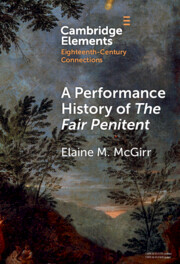Refine search
Actions for selected content:
2 results

A Performance History of The Fair Penitent
-
- Published online:
- 26 February 2024
- Print publication:
- 21 March 2024
-
- Element
- Export citation
2 - Darwinian Evil and Anti-Theistic Arguments
-
- Book:
- Animal Suffering and the Darwinian Problem of Evil
- Published online:
- 17 March 2020
- Print publication:
- 26 March 2020, pp 48-55
-
- Chapter
- Export citation
